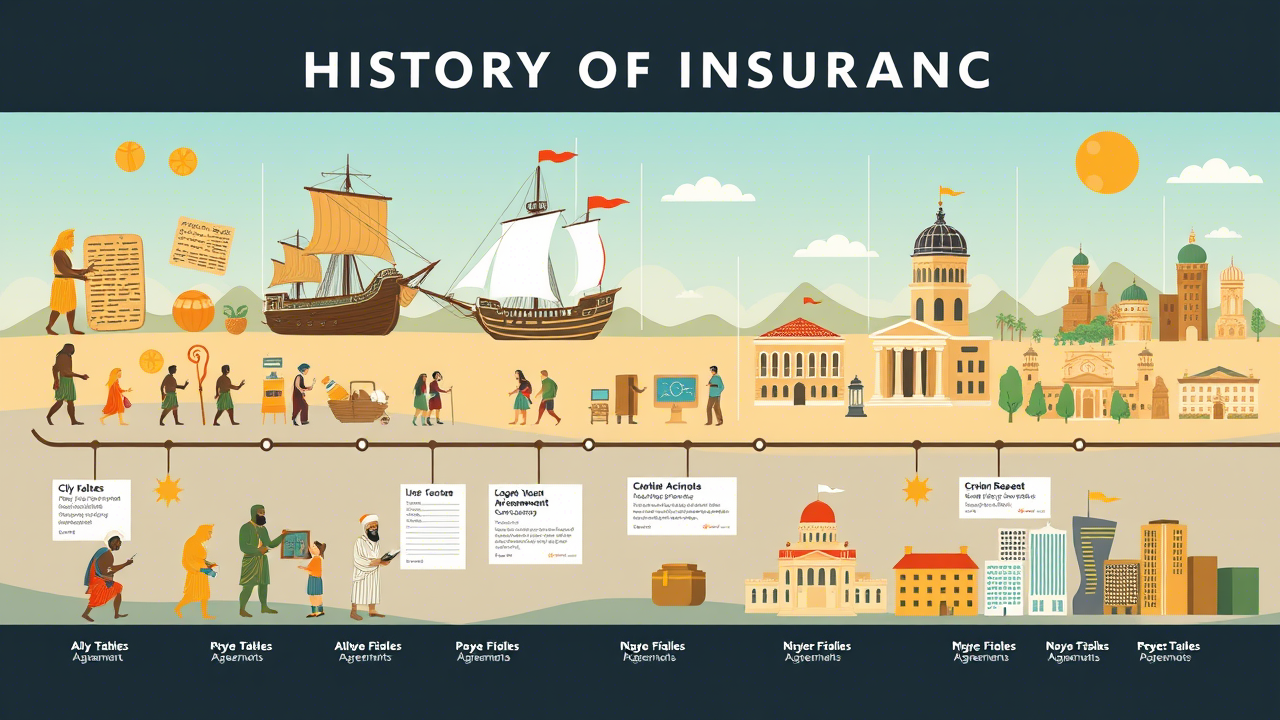The History of Insurance: From Ancient Times to Today

The History of Insurance: From Ancient Times to Today
Insurance is a concept that has been around for thousands of years, evolving from simple agreements between merchants to the sophisticated industry we know today. The history of insurance reflects humanity’s enduring desire to mitigate risk and protect against uncertainty. Let’s take a journey through time to explore how insurance has developed from its earliest forms to modern-day policies.

Ancient Beginnings: Risk Sharing in Early Societies
The origins of insurance can be traced back to ancient civilizations. In Mesopotamia, around 3000 BCE, traders and merchants engaged in a form of risk-sharing. Babylonian merchants developed a system where lenders would cancel a portion of a loan if the borrower’s shipment was lost at sea. This early form of insurance was documented in the Code of Hammurabi, one of the earliest legal codes.
Similarly, in ancient China, merchants divided their goods among multiple ships to minimize the risk of total loss in case of shipwrecks. This principle of spreading risk remains a foundation of modern insurance.
The Rise of Maritime Insurance in the Mediterranean
The Greeks and Romans further advanced insurance practices. Roman law included provisions for “bottomry,” a practice where merchants could take loans to fund voyages, and repayment was waived if the ship was lost. The Romans also had burial societies, which provided financial assistance to cover funeral expenses—an early form of life insurance.
During the Middle Ages, marine insurance became more structured. In Italy, especially in cities like Genoa and Venice, merchants developed contracts to insure ships and cargo. The first known insurance contract, signed in Genoa in 1347, formalized the practice of charging a premium for coverage against potential losses at sea.
The Birth of Modern Insurance: The London Influence
The 17th century marked a turning point in insurance history. London emerged as a major hub for insurance, largely due to the growth of international trade and commerce. The Great Fire of London in 1666 highlighted the need for fire insurance, leading to the establishment of the first fire insurance company by Nicholas Barbon.
At the same time, Edward Lloyd’s coffeehouse became a gathering place for merchants and shipowners. It evolved into Lloyd’s of London, a market that remains a global leader in insurance today. By the 18th century, life insurance was gaining popularity, with the formation of the Amicable Society for Perpetual Assurance in 1706.
Expansion and Regulation in the 19th and 20th Centuries
As industrialization progressed, so did the need for various types of insurance. The 19th century saw the rise of accident insurance, health insurance, and workers’ compensation policies. Governments also began regulating the industry to ensure fair practices and financial stability.
In the 20th century, automobile insurance became essential with the advent of cars, and social security programs were introduced to provide financial protection for retirees and the unemployed. The expansion of global markets also led to the growth of reinsurance, allowing companies to spread risks even further.
The Digital Age: Insurance in the 21st Century
Today, the insurance industry continues to evolve with technology. Online platforms, artificial intelligence, and blockchain are transforming the way policies are issued and managed. Insurtech companies are streamlining processes, making insurance more accessible and tailored to individual needs.
Despite these advancements, the core purpose of insurance remains unchanged: to provide financial protection and peace of mind. Whether it’s health, home, life, or cyber insurance, the industry continues to adapt to the changing needs of society.
Conclusion
From ancient maritime agreements to modern-day digital policies, insurance has come a long way. Its evolution reflects the fundamental human desire to prepare for the unexpected and protect what matters most. As new risks emerge, the insurance industry will undoubtedly continue to innovate, ensuring that individuals and businesses remain safeguarded against life’s uncertainties.